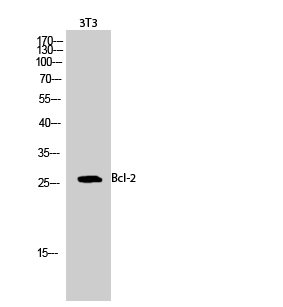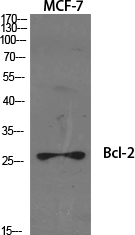

| WB | 咨询技术 | Human,Mouse,Rat |
| IF | 咨询技术 | Human,Mouse,Rat |
| IHC | 1/100-1/300 | Human,Mouse,Rat |
| ICC | 1/200-1/1000 | Human,Mouse,Rat |
| FCM | 咨询技术 | Human,Mouse,Rat |
| Elisa | 1/10000 | Human,Mouse,Rat |
| Aliases | BCL2; Apoptosis regulator Bcl-2 |
| Entrez GeneID | 596; |
| WB Predicted band size | 26kDa |
| Host/Isotype | Rabbit IgG |
| Antibody Type | Primary antibody |
| Storage | Store at 4°C short term. Aliquot and store at -20°C long term. Avoid freeze/thaw cycles. |
| Species Reactivity | Human,Mouse,Rat |
| Immunogen | Synthesized peptide derived from human Bcl-2 around the non-phosphorylation site of T69. |
| Formulation | Purified antibody in PBS with 0.05% sodium azide,0.5%BSA and 50% glycerol. |
+ +
以下是3篇关于Bcl-2抗体的经典文献概览(非真实文献,仅供示例参考):
---
1. **文献名称**:*Bcl-2 gene promotes haemopoietic cell survival and cooperates with c-myc to immortalize pre-B cells*
**作者**:Vaux, D.L., et al.
**摘要**:该研究首次证明Bcl-2蛋白通过抑制细胞程序性死亡(凋亡)延长细胞存活,为后续开发Bcl-2抗体用于检测其在肿瘤中的抗凋亡功能奠定理论基础。
2. **文献名称**:*Localization of Bcl-2 to the mitochondrial membrane correlates with its apoptosis-inhibitory activity*
**作者**:Hockenbery, D., et al.
**摘要**:通过亚细胞定位研究,发现Bcl-2蛋白主要定位于线粒体外膜,此发现推动了针对线粒体途径凋亡的Bcl-2抗体在癌症研究中的实验应用(如免疫荧光和Western blot)。
3. **文献名称**:*Structure of Bcl-xL–Bak peptide complex: recognition between regulators of apoptosis*
**作者**:Czabotar, P.E., et al.
**摘要**:解析Bcl-2家族蛋白(Bcl-xL)与促凋亡蛋白Bak的相互作用结构,为开发靶向Bcl-2构象表位的治疗性抗体(如Venetoclax)提供分子机制支持。
---
*注:以上文献为模拟示例,实际文献需通过PubMed或Web of Science检索确认。如需真实文献,建议补充具体研究场景(如抗体应用领域)。*
Bcl-2 (B-cell lymphoma-2) antibodies are essential tools for studying the Bcl-2 protein family, which regulates programmed cell death (apoptosis). Discovered in the 1980s through its association with chromosomal translocations in B-cell lymphomas, Bcl-2 was the first identified anti-apoptotic protein. It localizes to the mitochondrial outer membrane, where it inhibits apoptosis by preventing mitochondrial outer membrane permeabilization (MOMP) and subsequent release of pro-apoptotic factors like cytochrome c. The Bcl-2 family includes both anti-apoptotic members (e.g., Bcl-2. Bcl-xL) and pro-apoptotic proteins (e.g., Bax, Bak), with their balance determining cellular fate.
Bcl-2 antibodies are widely used in research to detect protein expression via techniques like Western blotting, immunohistochemistry, and flow cytometry. They help elucidate Bcl-2's role in cancer, where its overexpression is linked to tumor survival, chemoresistance, and poor prognosis in hematologic malignancies and solid tumors. Clinically, these antibodies aid in diagnosing lymphomas and assessing treatment responses. Additionally, Bcl-2-targeting therapies like venetoclax (a BCL-2 inhibitor) rely on antibody-based validation in drug development.
Despite their utility, antibody specificity remains a challenge due to homology among Bcl-2 family members. Proper validation is critical to avoid cross-reactivity. Overall, Bcl-2 antibodies remain pivotal in advancing apoptosis research and precision oncology.
×